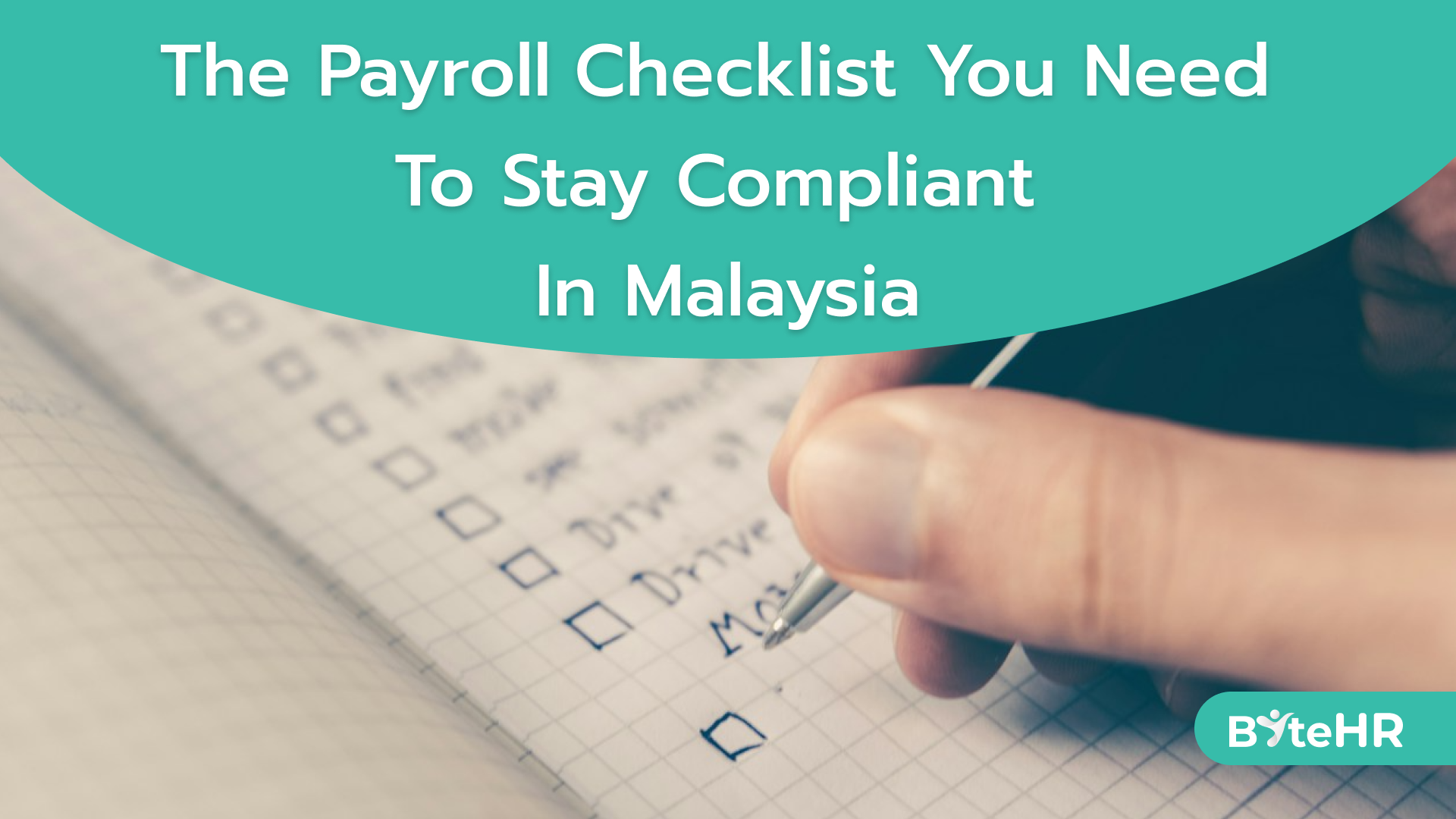The Payroll Checklist You Need to Stay Compliant in Malaysia

Bonus: Download your complete Malaysia payroll compliance checklist.
Processing payroll in Malaysia can cause panic and paranoia. Not because you can’t do common mathematics, but because it’s easy to make mistakes that can lead to legal issues.
How can you ensure you always process payroll compliantly with the laws in Malaysia?
The answer? Checklists.
Below, I’ve condensed the steps you need to take every month to ensure compliance in Malaysia into a pre-payroll, payroll and post-payroll checklist.
Download your complete Malaysia payroll compliance checklist.
Continue reading to see each checklist item, the relevant laws, and the penalties for non-compliance.
Payroll processing without errors! Most payroll solutions claim they’re “compliant,” but few keep up with Malaysia’s fast-changing rules. ByteHR goes beyond automation. It’s always updated to meet EPF, SOCSO, PCB, and EIS requirements, so you never risk penalties. ✅ Auto-updates for new laws & regulations 👉 Don’t gamble with compliance. Run payroll the right way with ByteHR. |
Prepayroll checklist
To ensure compliance with payroll requirements in Malaysia, the job starts long before payroll week.
Here’s the prepayroll checklist to ensure a compliant pay run.
- Review any updates to labour laws, EPF, SOCSO, EIS, and PCB.
- Confirm new hires and terminations are correctly updated in the system and statutory portals.
- Ensure employee details are current (bank, IC/passport, EPF/SOCSO/EIS numbers, tax file).
- Enter any salary changes, contract updates etc.
- Collect and approve attendance, OT, claims, unpaid leave, and incentives (bonus, commission, etc.)
Related laws
Employees Provident Fund Act 1991: Requires timely registration and accurate employee data.
SOCSO (Employees’ Social Security) Act 1969: Requires timely registration and accurate employee data.
Employment Insurance System Act 2017: Requires timely registration and accurate employee data.
Employment Act 1955: Requires proper employee classification, contract accuracy, leave, and wages.
Penalties for violation
EPF Act: Failure to register employees or inaccurate data can lead to a fine of up to RM10,000 or 6 months imprisonment
SOCSO Act: Non-registration can lead to a fine of up to RM5,000 and/or jail up to 2 years
Employment Act: Misclassification of an employee or improper contracts can lead to a fine of up to RM10,000 per offence
- Employment Act 1955: Up to RM10,000 fine per employee; repeat offences up to 5 years imprisonment
During Payroll checklist
Once it’s pay week, there’s no room for mistakes.
Do the following to improve your chances of processing payroll compliantly.
- Calculate gross and net pay using approved data.
- Verify PCB, EPF, SOCSO, and EIS computations for employee and employer.
- Cross-check fixed allowances, deductions, and variable incentives.
- Lock payroll after approval.
- Prepare and upload bank files for salary transfer.
- Distribute payslips to employees (via self-service app or email).
Using payroll software like ByteHR can help you automate all of these.
Related laws
Income Tax Act 1967: Mandates correct PCB computation and deducting allowances as taxable/ exempt
EPF Act 1991: Mandates the deduction and remittance of employee and employer EPF contributions
SOCSO Act 1969: Requires the deduction and remittance for employee social security
EIS Act 2017: Mandates proper deduction and remittance for employment insurance
Employment Act 1955: Mandates accurate and timely wage, payment, payslip provision, overtime, etc
Penalties for violation
If wages are not paid within seven days after the wage period ends, employees can lodge a complaint; the labour court may order payment
Employers violating EPF deduction rules (e.g., deducting employees’ EPF share but not remitting) may get imprisonment up to 6 years, a fine of up to RM20,000, or both
Incorrect PCB calculation can attract fines, surcharges, and prosecution
SOCSO contributions not made properly can lead to a fine of up to RM5,000 and/or jail for up to 2 years
Non-compliance with the EIS Act can attract a fine of up to RM10,000 and/or jail up to 2 years
Late wages/payslips can attract a fine of up to RM10,000 per offence
Postpayroll checklist
After processing your payroll at the end of the pay period, here’s a checklist of tasks to ensure compliance. This can also be used as an audit checklist.
- Remit EPF, SOCSO, EIS, and PCB to respective authorities by the 15th of the following month.
- Send final monthly payroll reports to the Finance/Accounts team.
- Reconcile all amounts between payroll reports, bank payment files, and government submissions to ensure accuracy.
- If discrepancies are found, prepare an adjustment for the upcoming month’s payroll.
- Record any payroll-cycle issues or improvement notes for the next run. (Optional)
Related laws
EPF Act 1991: Mandates on-time EPF contribution payment and statement submission. And requires updated records and annual reporting (e.g., Borang A)
SOCSO Act 1969: Requires timely SOCSO contributions and reporting
EIS Act 2017: Requires timely EIS contributions and compliance
Employment Act 1955: Mandates the issuance of payslips, record-keeping, and wage payment rules
Personal Data Protection Act (PDPA) 2010: Mandates secure storage of employee data
Income Tax Act 1967: Mandates submission of forms (e.g., EA) and 7-year record retention. And timely remittance of PCB and submission of employer returns
Penalties for violation
Penalties include fines, possible imprisonment for EPF. Jail term not exceeding 3 years or a fine up to RM10,000 (late contribution), or higher if deducting but not remitting
Furnishing false statements or failing to provide wage statements to employees may lead to a fine of up to RM2,000 and/or imprisonment of up to 6 months
Late PCB remittance/filings attract surcharges, fines, and prosecution
Late EPF contributions can lead to a fine of up to RM10,000 + possible jail up to 3 years
Late or no submission of SOCSO contribution can lead to a fine of up to RM5,000 and/or jail up to 2 years
Non-remittance of EIS deduction can lead to a fine of up to RM10,000 and/or jail for up to 2 years
Missing payslip, wrong payment, poor record-keeping: Fine up to RM10,000 per offence
Data breaches or unsecured payroll data: Hefty fines (potentially hundreds of thousands of ringgit) and possible imprisonment, depending on breach severity
Download your checklist
Download a monthly payroll checklist you can use for your monthly payroll processing and a master payroll checklist you can use for internal auditing and training.
Grab your complete Malaysia payroll compliance checklist.
You can share it with your team or modify it to add other items from your payroll process.
Payroll processing without errors!Most payroll solutions claim they’re “compliant,” but few keep up with Malaysia’s fast-changing rules. ByteHR goes beyond automation. It’s always updated to meet EPF, SOCSO, PCB, and EIS requirements, so you never risk penalties. ✅ Auto-updates for new laws & regulations 👉 Don’t gamble with compliance. Run payroll the right way with ByteHR. |
Disclaimer:
This checklist and the information shared are furnished for informational purposes only and not as legal advice. The reader should verify critical legal information when making decisions.


